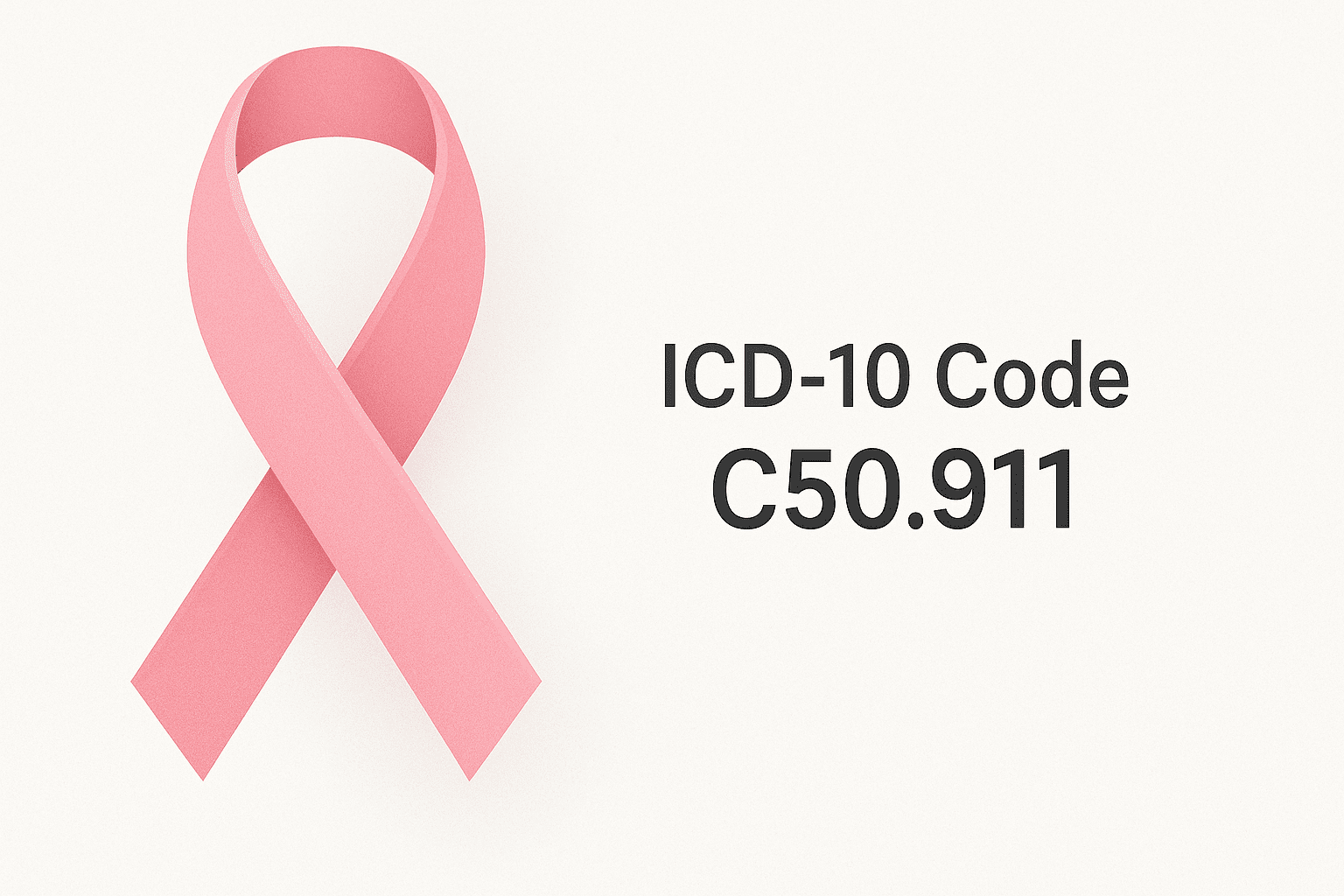Updated on: July 29, 2025
Breast cancer remains one of the most common cancers in women, with early diagnosis and accurate documentation playing a critical role in treatment outcomes and reimbursement. The ICD-10 code C50.911 is used when a malignant tumor is found in the right female breast, but the exact anatomical location (e.g., upper quadrant, nipple) is not specified in the clinical record.
This guide helps clinicians properly use and document C50.911, distinguish it from other site-specific breast cancer codes, and navigate diagnostic, staging, and treatment documentation with ease.
When to Use ICD-10 Code C50.911
Use C50.911 when:
-
There is a confirmed diagnosis of breast cancer in the right breast
-
The site within the breast is not documented or unclear
-
The patient is undergoing initial workup, biopsy, or staging
-
No quadrant-specific code (C50.1–C50.8) applies due to missing data
Note: Whenever possible, specify the location to use more precise codes like C50.411 (upper-outer quadrant of right breast) for better reporting and registry accuracy.
Differentiating Breast Cancer ICD-10 Codes
| ICD-10 Code | Diagnosis |
|---|---|
| C50.911 | Unspecified site, right female breast (default) |
| C50.919 | Unspecified site, unspecified breast |
| C50.412 | Upper-outer quadrant of left female breast |
| C50.411 | Upper-outer quadrant of right female breast |
| C50.921 | Central portion of right breast |
| C79.81 | Secondary malignant neoplasm of breast (metastatic) |
Key Documentation Elements
To support proper use of C50.911, your note should include:
-
Confirmation of malignancy (via imaging, biopsy, or histopathology)
-
Breast side: Right
-
Gender: Female
-
Absence of quadrant/site detail
-
If known, include details like TNM stage, histologic grade, or ER/PR/HER2 status
Clinical Scenario Examples
| Scenario | Code |
|---|---|
| Positive biopsy for malignancy in right breast; no quadrant recorded | C50.911 |
| Tumor in right upper-outer quadrant clearly documented | C50.411 |
| Suspicious mass, right breast, awaiting biopsy | N63 + Z12.31 |
| Diagnosed breast cancer with unknown site or incomplete referral details | C50.911 |
| Cancer involving both breasts | C50.911 + C50.912 (if site unclear) |
Diagnostic Process and Imaging
Common Diagnostic Tools:
-
Mammography (Screening & Diagnostic)
-
Ultrasound (especially in dense breast tissue)
-
MRI (for staging, multifocal disease)
-
Core Needle Biopsy (for definitive diagnosis)
Additional Workup:
-
Estrogen/Progesterone receptor testing (ER/PR)
-
HER2/neu testing
-
Genomic profiling (Oncotype DX, Mammaprint)
-
Axillary lymph node evaluation (via sentinel node biopsy)
Sample SOAP Note – C50.911
-
S: “Patient found a lump in her right breast during self-exam.”
-
O: Palpable, firm, mobile mass in right breast, ~2 cm. Mammogram BI-RADS 5. Awaiting core biopsy results.
-
A: Suspicious breast mass, likely malignancy. Location unspecified within right breast.
-
P: Proceed with biopsy. Tentative diagnosis: malignant neoplasm, right breast – site unspecified (C50.911). Begin staging workup (US axilla, CBC, liver enzymes).
Clinical Documentation Tips
| Do | Don’t |
|---|---|
| Document breast side clearly | Use C50.919 (unspecified breast) if right side is known |
| Include biopsy type and histology (IDC, ILC, DCIS, etc.) | Omit cancer grade or receptor status if available |
| Update code when quadrant or lobe is confirmed | Continue using unspecified site code unnecessarily |
| Mention if site is unknown due to external referral or incomplete data | Leave documentation vague without clarification |
Breast Cancer Staging (AJCC 8th Edition)
| Stage | Findings |
|---|---|
| 0 | DCIS or LCIS (in situ) |
| I | Tumor ≤2 cm, no nodes |
| II | Tumor 2–5 cm or node-positive |
| III | Large tumor (>5 cm) or extensive nodal involvement |
| IV | Metastasis to distant sites |
Use Z85.3 for a history of breast cancer (after remission).
Use C79.x for metastatic disease (e.g., C79.81 – Secondary to breast).
Common Treatment Options to Document
| Modality | Examples |
|---|---|
| Surgical | Lumpectomy, Mastectomy, Axillary Dissection |
| Chemotherapy | Neoadjuvant (pre-op) or Adjuvant (post-op) |
| Radiation | Whole breast or partial breast irradiation |
| Endocrine | Tamoxifen, Aromatase Inhibitors (if ER+) |
| Targeted | Trastuzumab (Herceptin) for HER2+ cancers |
Related Codes for Full Documentation
| Clinical Detail | ICD-10 Code |
|---|---|
| Right breast malignancy (site unspecified) | C50.911 |
| Malignancy with unknown ER/PR status | Z17.0 |
| Neoplasm of uncertain behavior, breast | D48.6 |
| Personal history of breast cancer | Z85.3 |
| Family history of breast cancer | Z80.3 |
| Genetic susceptibility (BRCA+) | Z15.01 |
| Encounter for screening mammogram | Z12.31 |
FAQs
When should I switch from C50.911 to a more specific site code?
As soon as you have imaging, surgical, or pathology data specifying the tumor’s quadrant (e.g., upper-outer), update to the appropriate C50.41x code.
Can C50.911 be used indefinitely?
No. It’s a temporary or initial-use code. Precise documentation is expected for staging and registry purposes once data is available.
What if the patient is male?
Use C50.921 for unspecified site of right breast in male patients. The 5th digit of the code distinguishes gender.
How DocScrib Simplifies Breast Cancer Documentation
DocScrib empowers oncology teams by:
✅ Automatically detecting cancer-related terms and suggesting the most specific ICD-10 codes
✅ Integrating mammogram and biopsy results into documentation templates
✅ Generating auto-filled SOAP and staging notes
✅ Offering checklist-based prompts for ER/PR, HER2, and BRCA data
🎯 Book your free DocScrib demo today to streamline oncology documentation and coding.
Conclusion
ICD-10 Code C50.911 is essential during the early stages of breast cancer diagnosis when the right breast is involved, but specific location data is unavailable. However, it should transition to a more precise code as diagnostic clarity improves. With the right tools like DocScrib, clinicians can ensure timely, specific, and compliant oncology documentation—every step of the way.
